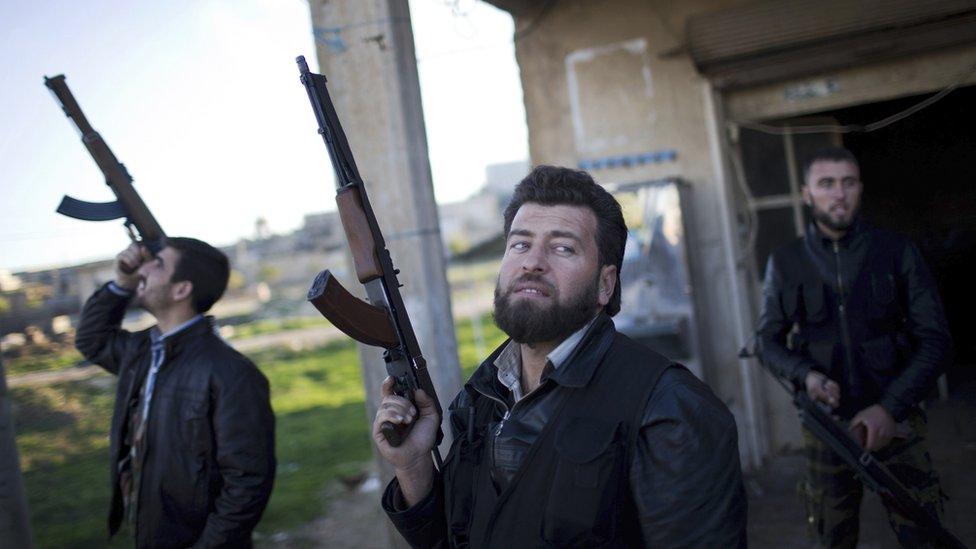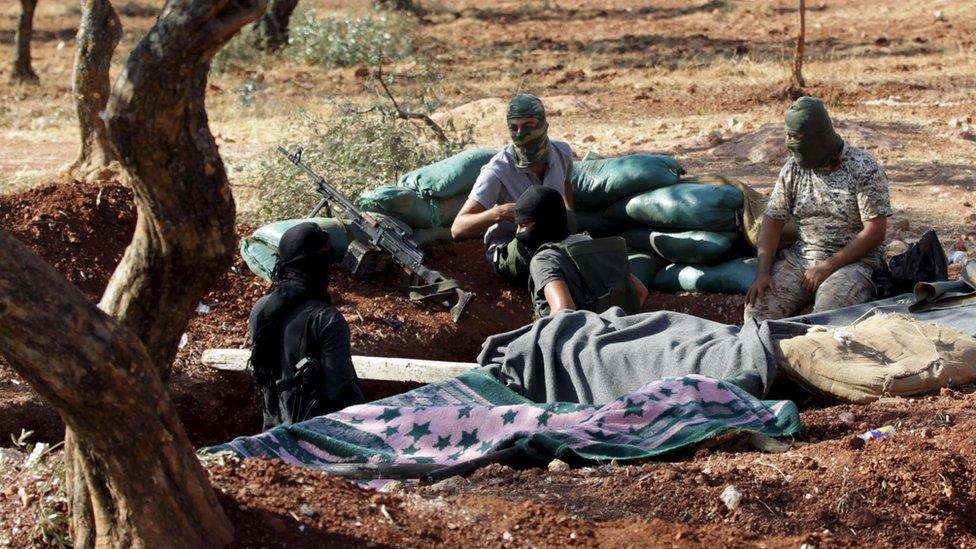Syria conflict: Who are the groups fighting Assad?
- Published

The Free Syrian Army was the first recognised military opposition group to President Assad
The conflict in Syria has been going on for four years, beginning with anti-government protests before escalating into a full-scale civil war. Who are the groups fighting President Assad?
Bashar al-Assad had been well briefed on the challenges that had threatened his father Hafez's rule.
In brutally crushing the Hama uprising in 1982, external, Hafez ensured the state's security apparatus would be constantly in a position to control civil society in Syria and eliminate any effort for mobilisation within the mercantile middle class in Syrian cities.
This played a role in the development of the armed struggle against the current government in Syria.
Following the bloody crackdown on protesters during the early days of the Syrian uprising in 2011, the decision to pick up weapons against the government came from within President Assad's own ranks in the armed forces.
Syrian soldiers were increasingly refusing orders and defecting from their positions.
This occurred especially in the rural border provinces with the encouragement of Syria's neighbouring countries, which had either taken a public stand against Bashar al-Assad, or at least distanced themselves from the Syrian government.
The Free Syrian Army (FSA) was the first recognised military opposition group to President Assad.
But as more senior commanders deserted President Assad's army, the FSA's failure to establish a unified command structure was the main obstacle to the group's ability to secure large territorial gains from the Syrian government despite support from Turkey, Qatar and Western governments.
The FSA was constantly splintering into competing factions. And as the war in Syria became more atrocious, it began to be reshaped along sectarian lines. A rise in the number of jihadists - both Syrian and foreign - soon followed.
By the end of 2012, jihadist groups were at the core of the anti-Assad front, securing and maintaining territorial control.
Islamist groups in Syria can, however, be distinguished from one another by their goals, the source of their funding and the composition of their manpower.
While many groups are predominantly Syrian, others are of a more international structure. The main Syrian Islamist groups include Ahrar al-Sham and Jaysh Al Islam.
The most notorious international jihadist groups remain the Islamic State (IS) and the Nusra Front - al-Qaeda's affiliate in Syria. The Nusra Front split with IS in 2013, with IS declaring the establishment of an Islamic caliphate in Syria and Iraq a year later.

The Nusra Front first announced its existence in January 2012
By mid-2014, there were three main forces in Syria opposing President Assad:
the FSA
Islamist Syrian rebel groups
international jihadist groups
However, ideological and political disagreements within the different opposition groups and their respective international backers led to splintering and fighting within the opposition.
It wasn't until the first half of 2015 that efforts by the main opposition backers - Saudi Arabia, Turkey and Qatar - led to the creation of an umbrella group in Syria, known asJaish al-Fateh (the Army of Conquest).
The coalition encompassed the majority of those groups, including the Nusra Front and Ahrar al-Sham, as an effective grouping of fighters in northern Syria, which succeeded in contesting more territory from the Syrian government, as well as opposing the otherwise rapid expansion of IS.
In the midst of it all, many Kurdish parties had seen in the uprising a chance to break years of strict nationalist control over their areas and establish local administrative rule. For instance, the Kurdish People's Protection Unit (YPG) were able to enforce the retreat of IS from their territory.
More recently, a new alliance of Kurds, Christians and Arabs, called the Syrian Democratic Forces, has pushed back IS militants along the Iraqi-Syria border, signalling the emergence of yet another powerful competitor to President Assad, whose forces today control less than 22% of Syrian territory.
Who’s fighting whom in Syria? Explained in 90 seconds
Ghadi Sary is the Academy Asfari fellow for the Middle East and North Africa programme at the think tank Chatham House, external, which is running the Syria and its Neighbours Policy Initiative, external.